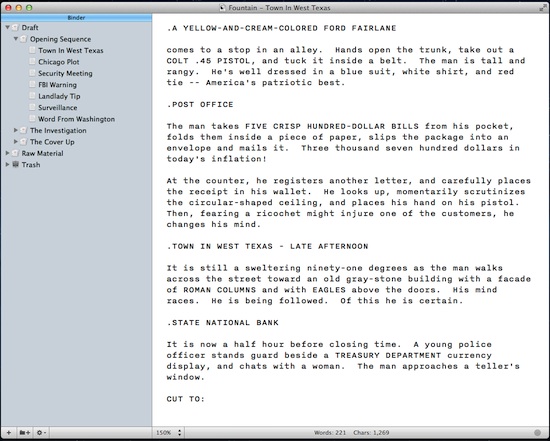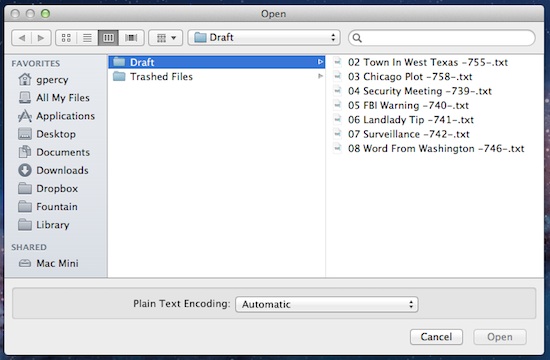Amazon Studios has been a [much](http://johnaugust.com/2010/on-the-amazon-film-thing)-[discussed](http://johnaugust.com/2011/amazon-studios-now-slightly-less-terrible) [topic](http://johnaugust.com/2012/amazon-studios-and-the-free-option) on both the blog and the podcast. Last week at the Austin Film Festival, the company made a presentation explaining how they work with screenwriters.
Reader Mike attended and took notes, which he generously offered to write up.
—
![]() A little bit about my background: I started out working at a production company as an intern and as a reader, kept working at writing and eventually got representation from a manager and an agent. I’ve had scripts go out and I’ve done the studio water bottle tour a couple of times, but have yet to earn a single penny as a writer.
A little bit about my background: I started out working at a production company as an intern and as a reader, kept working at writing and eventually got representation from a manager and an agent. I’ve had scripts go out and I’ve done the studio water bottle tour a couple of times, but have yet to earn a single penny as a writer.
I consider myself in that grey, ugly pool of zombie writers: Part alive, but mostly dead inside.
I’m guessing the crowd ranged from people like me to those who are thinking about writing their first screenplays. I had heard a lot things about Amazon (including on the podcast), so I went in with an ass-load of skepticism along with a tiny bit of hope. Unfortunately, very little during the panel moved the skeptic needle, and it pretty much pissed all over the hope.
Again, I can only speak for myself.
First, it wasn’t really a panel. There was one Dude at a podium, so it was more like a new-hire presentation at Dundler Mifflin rather than a Q&A with a studio exec. The Dude, head of development at Amazon Studios I think, seemed nice enough and intelligent enough, but he used the phrase “I’d rather not get into the details of that” way too often for my tastes.
Bullet points:
* Writers can upload their scripts to the Amazon Studios site as a non-WGA writer, or if they are WGA they can have their rep upload.
* Once a writer uploads his script, he cannot sell his script to anyone for 45 days. Essentially a free 45-day option.
* If Amazon is interested, they will option the script for a period of 18 months for $10k.
* If that script goes into production, the writer will be paid $200k, with some other pay-outs if the film reaches certain financial milestones.
* They also have open writing assignments from time to time, and these are handled much the same way, with writers submitting their work on the website for consideration for the gig.
All of this is well and good on the surface. I am not a million-dollar-screenwriter by any stretch of the imagination, but I do have some access to the lords of Hollywood. If I didn’t have anywhere to go with my scripts, I would probably be interested in what the Dude had to say. However, once he said they have somewhere around 10,000 submissions with 22 projects in development, it doesn’t take a Harvard grad to do the math and realize your odds are just as good in the traditional studio system.
The things that I found puzzling were mainly around their development process and their overall plan.
The Dude explained their development process by talking about information studios gather from test screening and how it is used. Basically saying that once you shoot a film, you have a test screening and get feedback from the general public on what they liked and didn’t like about the story, the characters or whatever. Meaning that the problem is that the film is already shot, so there is only so much you can do to alter it.
At Amazon (wait for it) they want to get public feedback (through their website) on the script as it is being developed so they can make changes before they begin shooting. They plan on doing this through several methods. They already have comic books made from a script in development that they are asking for feedback on. They are also thinking of making short videos and other things to get parts of the script out there and gather opinions from Amazon’s customers. The writer will get this info and incorporate it as notes for rewrites. Now, the Dude did say it is up to the writer to do what he wants with these notes. You be the judge on that. On one hand, I’d like to congratulate them on thinking outside the box on development. But I see problems with this, as I’m sure you do as well.
The other problem I had was with their overall plan: There doesn’t seem to be one.
They have a first-look deal with Warner Bros., but when he was asked questions about the deal he defaulted to the “I’d rather not get into the details of that.” He was asked what type of genres or budget ranges they were looking at, and he didn’t really have an answer. I would have been more impressed if they picked a direction, like saying, “We want to provide funding for small, independent minded stories that might not get a shot in the Hollywood system,” or saying, “We are looking for big, tent-pole, event movies.”
I had other concerns, but that was pretty much the thing in a nutshell. I think it great that someone with money is jumping in, and I hope for the best, but it looks like there are problems with hair on them, and I think there are some very rough growing pains in the making.


 Six years later, I see the sign every day when I drive home taking Gower. I’ve learned not to stare. Since I last checked in with you good folks, I’ve seen some great gains in my day job and my writing. The day job is a bit more tangible to brag about to my parents because it’s tough to explain that holy crap my dialogue finally doesn’t suck!
Six years later, I see the sign every day when I drive home taking Gower. I’ve learned not to stare. Since I last checked in with you good folks, I’ve seen some great gains in my day job and my writing. The day job is a bit more tangible to brag about to my parents because it’s tough to explain that holy crap my dialogue finally doesn’t suck!